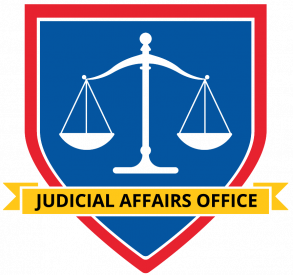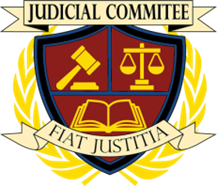Judicial Affairs
The Judicial System of the Alma Mater Society is an independent system composed of the Judicial Committee (JCOMM), which is the adjudicative branch, and the Judicial Affairs Office, which is the investigative branch. The Judicial System of the Alma Mater Society is the first and oldest in Canada, being established by Principle Grant in 1898. To date, the AMS Judicial Affairs Office remains the only of its kind, and a unique hallmark of student life at Queen’s University. In all affairs, the Judicial System aims to promote positive values at Queen’s, and uphold the values of Restorative Justice, Peer-Administered, Complaint-Driven, Non-Adversarial, and Procedural Fairness. The Judicial System is governed by the Judicial Policy, and Appointments Policy.

Judicial Affairs Office
The Judicial Affairs Office investigates Category 1 Non-Academic Misconduct (NAM) Cases, as referred to it by the Non-Academic Misconduct Intake Office (NAMIO) as well as Suspected Policy Infraction (SPI) cases. The Judicial Affairs Office also supports the Student Conduct Office in implementing educational outcomes, and offers peer-to-peer guidance to students involved in NAM cases. Lastly, the office also provides training to key stakeholders on matters of Non-Academic Misconduct, and values of student conduct.
The Judicial Affairs Office is led by the Judicial Case Manager and Judicial Disputes Manager, who work together to lead a team of deputies and investigate any complaints and/or cases referred to the JAO. The Judicial Case Manager is primarily responsible for Non-Academic Misconduct cases, as well as educational and peer-to-peer support for students going through the system. The Judicial Disputes Manager, is primarily responsible for investigating suspected policy infractions; and supporting any policy review or development. The judicial managers are supported by Judicial Deputies, who work at the direction of the managers to support the office by research and other projects to advocate for and/or improve equitable access to the system. The Judicial Deputy role is meant to provide students with experiential learning opportunities to develop their skills in policy, research, advocacy and learn case investigation proceedings.
Judicial Committee
The Judicial Committee (JCOMM) is composed of up to 9 undergraduate students, each from a different faculty, led by the Judicial Committee Chair and is the highest adjudicative body of the Society. The Judicial Committee hears all cases handled by the Judicial Affairs Office, in addition to other cases relating to policy and governance proceedings.
The Alma Mater Society recognizes the importance of a diversity, particularly diversity of thought, in the AMS Judicial Committee. Hiring for members of the Judicial Committee follows the Appointment Policy, and is initially based on the candidate’s membership in an academic faculty on campus. One JCOMM seat is reserved to students in Arts, Science, Computing*, Kinesiology & Physical Education*, Nursing, Engineering, Commerce, Health Science and Concurrent Education*. Hiring normally occurs during the Winter Hiring period.
*If the hiring panel is unable to fill these seats, the next best candidate from the Arts or Science application pools is hired. If a vacancy persists, the next best candidate is hired.

Types of Hearings
The AMS Judicial Committee hears all cases handled by the Judicial Affairs Office. There are two types of hearings that may occur:
- Partial Hearings, in the event that an informal resolution is achieved between the Judicial Affairs Office, and respondents. Partial hearings may also occur if the respondents agrees to some but not all findings of JAO.
- Full Hearings, in the event that the respondent does not agree to any finding of the JAO.
Appeals of the Judicial Committee in matters of Suspected Policy Infractions can be heard by the Judicial Appeals Board. Appeals of Non-Academic Misconduct Cases follow NAM Appeals Procedures of the University. No case resolved via an Informal Resolution is subject to appeal.
The AMS Judicial Committee is the ultimate authority on interpreting the AMS Constitution, and all other relevant Society Policies. If you are unclear about what a policy or constitution means, you may bring your concerns to one of the following, who has the authority to initiate a formal hearing:
- Secretary of Internal Affairs (Secretariat)
- Judicial Affairs Office
- The AMS Assembly, which can request a constitutional interpretation by a 2/3 majority.
Constitutional Interpretations may not occur if there is a suspected policy infraction, and are binding for the Society. All new policies must follow the spirit of JCOMM’s decision.
The AMS Judicial Committee is the only level of appeal for all Society elections, including elections of faculty societies. The AMS Judicial Committee hears appeals of:
- Any decision made by the Election Team
- Any decision made by the CEO/CRO
- Appeals of the Election Results
- Disqualification decisions, within 24 hours
If you would like to appeal a decision related to Elections, please contact the Secretariat to request a hearing and learn more about the procedure.
Any member of the Society and/or Assembly may appeal a ruling made by the Speaker of the AMS Assembly by sending a written request to the Chief Governance Officer 72 hours after the ruling was made; and outlining the ground(s) to appeal. Please note that in their capacity of Speaker, the Speaker may normally make any ruling, following the spirit and principles of Assembly, to ensure that such meetings meet their mandate and remain and open and respectful forum for discussion.
The AMS Judicial Committee has jurisdiction to ensure that the Conflict of Interest guidelines outlined by the Appointments Policy of the Society are upheld; and to protect key governance proceedings from actual or perceived bias. The AMS Judicial Committee does not have jurisdiction over hiring-related or corporate conflicts of interest.
For any questions or concerns, please contact the Chief Governance Officer.
From time to time, if there are concerns raised about the AMS Election Team or Judicial Affairs Office; or if members of the team are unsure on how to proceed in a specific situation, the Secretariat may request an oversight hearing to receive further guidance from the Judicial Committee on how to navigate a situation. Such hearings may only be requested by the Secretariat, and their purpose is to ensure that the AMS Election Team and Judicial Affairs Office uphold their mandates. These hearings are not open to the public, and serve as a forum for learning and feedback for members of the Internal Affairs Office.
What are the Pillars of Non-Academic Misconduct (NAM)?
As outlined in the NAM Policy and Procedures Manual, there are five pillars that the AMS NAM system must adhere to:
Restorative Justice: Emphasizes the importance of elevating the role of victims and community members through active involvement in the misconduct process, holding Students directly accountable to the people and communities harmed by their conduct, restoring the emotional and material losses of victims, and providing a range of opportunities for dialogue, negotiation, and problem solving, whenever possible. The goal is to achieve a greater sense of community safety and social harmony for all involved and requires the willing joint participation of students and those impacted.
Peer-administered: Upholds the non-adversarial and restorative nature of the NAM system and recognizes the inherent value of peers supporting student development and learning to become positive community members and citizens.
Complaint-driven: The JAO responds to cases referred to its office by, where appropriate, meeting with those impacted and/or harmed by the actions in order to fulsomely understand the complaint.
Non-Adversarial: The AMS Judicial System strives to approach NAM cases in a collaborative way with all participants in order to arrive at resolutions that balance the interests of those involved.
Adherence to the Principles of Procedural Fairness: Respondents have the right to:
a. be advised, in writing, of the allegations;
b. have a case heard and decided by an unbiased decision-maker;
c. formal written notice of any adjudication date;
d. an advisor, including the assistance of a Support Person or Advisor;
e. present evidence and arguments in response to an allegation of non-academic misconduct;
f. be provided with written reasons for the decision(s) made in their case.
Annual Reports
Every year, the Judicial Affairs Managers make a full report to the AMS Assembly detailing activities of the Judicial System, and the state of Non-Academic Misconduct. To read the Queen’s University NAM Reports, visit the Non-Academic Misconduct page.